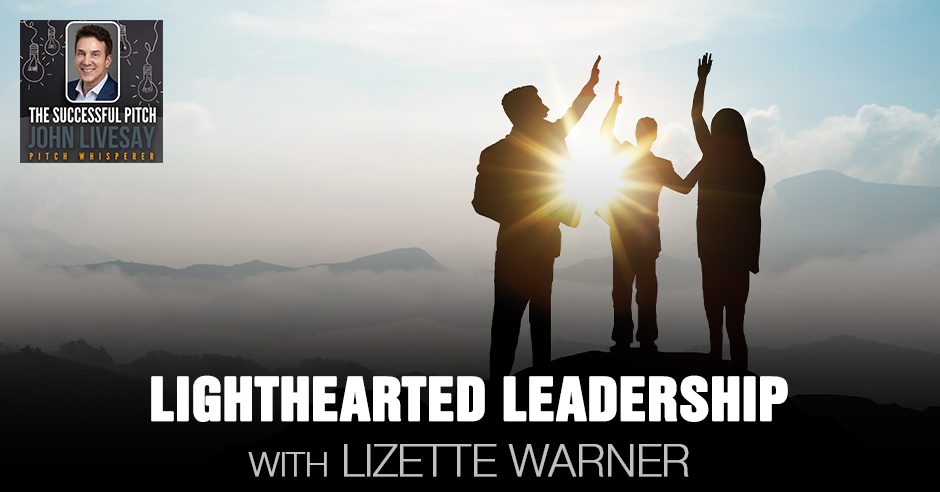Lighthearted Leadership With Lizette Warner
Posted by John Livesay in podcast0 comments

The world we live in can sometimes be really depressing. We turn on the TV, watch the news and all we see is pain and suffering. Learn how to convert those depressing thoughts into something more lighthearted. Transform your stress into positive energy. Join your host, John Livesay and his guest Lizette Warner as they discuss lighthearted leadership. Lizette is the Head of Clinical Science Global, MR Therapy of Philips and the Executive Coach of Optimum Vobis. Join in the conversation to learn how to take things slower. To take a break and just let things be more lighthearted. We don’t need to be stressed out for eternity, join in to find happiness today.
—
Listen to the podcast here
Lighthearted Leadership With Lizette Warner
Our guest on the show is Lizette Warner, who has a whole program about how to be a lighthearted leader. Whatever things are, start your meetings off with music. She has some wisdom from sixth grade about, “The news is depressing. I don’t want to be.”
—
Our guest is Dr. Lizette Warner, a wife, mother, Executive Coach, Podcast Host of Lighthearted Leadership and a busy global leader in healthcare. She’s passionate about helping people reach their best and unleash their inner superheroes in a fun way. She started her Lighthearted Leadership podcast as a way to shed optimism and lightheartedness on the pile of heavy topics bringing down her busy healthcare leaders. She’s got an Electrical Engineering background and has worked in telecom and pursued her PhD at the Mayo Clinic. She was then snatched right up by a healthcare company and has worked there ever since. Welcome to the show.
John, thanks for having me.
I always like to ask my guests to take us back to their own story of origin. You can start in childhood or school, wherever you want to start this story of how did you get to be you.
I feel like you’ve already given the readers a good overview here. I could go all the way back to the beginning like when I was a little kid. I was pretty much like the butt of everybody’s jokes. I was the youngest too, which always makes that difficult. The thing with that is that I grew up very super serious and always expecting people poking fun at me. I was also super gifted, only I didn’t know it. I assumed everybody else did math problems without having to write them down. I assumed everybody could read and remember everything about all the homework and things.
[bctt tweet=”In coaching, you learn to love that feeling of bringing out the best in people.” via=”no”]
It was surprising to me like, “You can’t?” I just assumed that. As a result, I went for my Electrical Engineering degree. I graduated and went into work in telecom. That was fun. I lived in different countries and meeting a bunch of different people. It was exotic from that perspective. My mom graduated from third grade. That was as far as she made it. The thing is my mom is one of the smartest people I know. She can do like geometry because she’s a seamstress. She was always good at these math things.
Growing up, I didn’t know this. I picked this up later in life. I never knew she didn’t have this concept of being able to do the math. It was something assuming everybody else can do stuff and know stuff. I remember going to her with this intractable problem that I had in high school. I went up and I don’t know I’m explaining the whole problem, telling her what’s going on in class and she’s sitting there essentially coaching me through this whole thing. What can you do? What is possible? All of a sudden, I walked away thinking my mom is the smartest person on the planet because she helped me solve this problem.
As I went through school, I didn’t even know what a coach was. I went to school and work. I was living in all these different countries. I wanted to get my PhD and for some reason, the Mayo Clinic accepted me. I ended up studying there still with this mindset of everybody knows more than I do. When I finished, I was snatched up by a healthcare company. I was exposed to a certain extent before that to coaching but that’s where I got a picture of coaching. As I climbed through, I had a team of my own and I started coaching them.
I fell in love with being able to bring out the best in these really bright people and bringing able to bring out the best in them to unleash great stuff. What I discovered through all of that, I started laughing with my clients. That’s why I do this whole Lighthearted Leadership is because in working with my clients and trying to curate topics, content and articles for them, I was looking up lighthearted content. The whole thing about being lighthearted is people think that you can be lighthearted or you can have fun but not at work. That’s for that after-work stuff. Being lighthearted doesn’t mean that you can’t have fun.
Also, that you’re not smart. You’ve got your PhD. Let’s talk about some of the work you do at Philips and then we’ll talk about some of the work you do with coaches. Your head of clinical science globally, not the US around oncology, which is not normally a topic people think, “Cancer, let’s have a blast.” You’re working with scientists. Your job is to manage these studies and see what is possible in terms of fixing things, I’m imagining or improving things. Do you have a story of a particular research study that you’ve worked on that you were able to put some humor in?

Lighthearted Leadership: People think that you can be lighthearted only after work, that it’s reserved only for after-work. But being lighthearted means you can have fun wherever, whenever.
That’s the thing. We’ve worked with a number of collaborators globally. The thing about putting, let’s say, a lighthearted spin to it is even starting off the meetings. Because some of the topics that we get into are very heavy or they’re very physics loaded. It means there’s a whole lot of thinking but there’s also this aspect of let’s back off and see what’s the ramification, the global outlook for this. There’s not a specific story that comes to mind. It’s more the aspect of when we launch in, checking in. There’s sometimes where I have like music going at the beginning of a call. It can be people globally. I ended up speaking to a lot of lawyers and regulatory people. They’ll log onto the call and there’s music going. It’s a thing that’s like, “Where am I?” People start grooving a little bit and it breaks the ice so that we can start talking about these deeper topics that can be legal, regulatory or a clinical study that’s ongoing but that habit tends to bring people a little bit closer together. Bringing people together and telling a story that people can be a part of. With that music, that tells us sometimes. This is not a specific humorous story.
You also talk about on your show this concept of long working hours killing us. Certainly, people can be workaholics. Now with the pandemic, a lot of people that found that blur between work and home, that they’re working more hours than when they went to an office. What are your thoughts on that? What can leaders do to prevent people from burning out?
You’ve seen a lot of this with working with a lot of the people that you talked to as well and the space that you work with but that is the thing. There is that blurred boundary of having all your work now at home. Instead of being chained to a desk, you’re now chained to your home office or your kitchen table or whatever and not being able to step away. One of the things that we did as a leadership team when the whole pandemic first started, my organization, at least my team, we have always been remote-based. We were able to tap into the wisdom from my team on, “How do you guys do this?” That was the thing. At the very beginning, people were able to appreciate that, “You guys do this all the time.” Now people are starting to appreciate that, “This is tough.” Some of the takeaways that we had shared as a leadership team were this concept of putting things in your calendar including a break time where you work for a chunk of time and then stop, pause, step away, go outside, take a breath of fresh air, go walk the dog or do something away from the workpiece.
I’ve heard of this in terms of changing your state. If you’re sitting, stand up. If you’re standing, sit down. When you physically change your state, it also helps mentally hit a reset button.
It does and even doing different things like having that music break. One of the things that I talked about on the podcast were these back-to-back meetings that people schedule and I think that is an energy suck. It’s like that vampire at work. It pulls all the life out of you. There are ways to deal with that too. If it’s a case of like making that mental commitment to yourself that, “I’ve got another meeting following this one.” For my sanity and everybody else’s, I’m going to have to bail 5, 10 minutes early so I can prep.
You have something on here about your sixth-grade wisdom, “The news is depressing and I don’t want to be.” Tell me a little bit about that. That’s hilarious.
[bctt tweet=”Start off your meetings with music, schedule breaks to prevent burnout.” via=”no”]
It was funny. I was having this conversation with a client. When I was in sixth grade, that was the first thing that was weighing heavy on my mind is the news. Every day I would come into school and I’m like, “This is so depressing.” I was in sixth grade and I don’t even know what was going on but I knew it was heavy. Psychologists recommend to people read, do not watch the news. We have these mirror neurons. I don’t know if you’re familiar with this. It’s a finding from neuroscience. This concept that what you see, what you envision, what you pick up from others, you take that on yourself physiologically. If you’re watching a stressful, scary movie, your body is picking up on those stressors as if you were there.
It’s not good to watch the fire or when 9/11 happened. People were constantly watching that happening over and over again and reliving it every time you watch it.
That is exactly what’s happening. Your body is releasing all of these neurohormones, neurotransmitters and you can be having a stress reaction. My sixth-grade wisdom somehow picked up on this. I’m like, “This stinks. I am not watching the news ever again.” Since then, every once in a while I’ll go back to watching the news. It’s about since sixth grade. I started watching the late shows and comedy. I started reading comedy things. That’s where the whole lightheartedness came from this Lighthearted Leadership Podcast. It was something simple. I was trying to curate lighthearted articles to send to my leaders and I was coming up empty.
I found an article from a few years ago. I found another article from over here. I found a book here but when you’re trying to curate stuff, to give it to your leaders so that they can have something to read, I was like, “This stinks.” I was reminded of my sixth-grade wisdom. I’m like, “That’s going to change.” That’s why I started Lighthearted Leadership. With all these heavy news topics but I could bring a lightheartedness to it. I do take on topics like, “Are Long Working Hours Killing You? Let’s talk about it.”
You were coaching some executives and what I love about what you do there is it’s very niche and you’ve also been in their shoes. Can you tell us about that?

Lighthearted Leadership: People need to have a calendar and put a break time where you work for a chunk of time and then stop. They need to go outside, take a breath of fresh air, and do something away from work.
It is intriguing. Being able to bring in the native knowledge, having worked in the field and knowing what it’s like to have back-to-back meetings, to have them yourselves at the same time as I’m coaching certain clients. Having that, there’s an ability to be able to relate. It goes back to your story of giving that story that people can feel that they’re a part of is them being able to relate that, “I know exactly what that’s like.” I’ve managed a household with little kids moving across the country and trying to go to school. I remember when I was trying to get my PhD, I already had little kids at that time and everyone else who was going for their PhD did not.
They came straight from college into the PhD track and maybe they got married during that timeframe but we already had little kids. They all looked at me like, “How are you doing this with kids?” I’m like, “They are the great equalizer. They’re the ones who keep me on track. At home, I’m doing my thing and I have a time limit. I get all my stuff done. Somebody is taking a nap so I have this much time to work on this. My colleagues were more of the aspect of like, “Let’s go to the bar. Let’s go do this.“ I was always very focused again a little bit of the serious and bringing in that balancing with the kids, that whole life parted aspect of somebody drew on the walls of the house with a permanent marker. That’s fun.
I remember talking to a colleague once. She said, “Do you know how much energy it takes to come to work and be fully present in the meetings and sales calls? That’s how much energy it takes when I go home. That’s my second job.” What do you think about that? Is that your experience as well?
Maybe a little bit different. I didn’t take that tactic with the kids. With them, it was stressful but also fun in a certain way because here you are helping someone else grow and get that wisdom and learn. It’s almost like coaching. There’s always a discovery moment for the coach, as well as for the client in any conversation. It’s the same with parenting. In parenting, it was always the same. I was constantly learning something else about myself. Whether it’s, “What are my limits? I’m going to murder this child if he does not get out of his pajamas and get some clothes on so we can go to school.”
What are some of the big struggles you see with the clients that you’re coaching? Are there unique stresses or challenges if someone’s in healthcare that they’re seeing people sick and die that typical people, let’s say, maybe in accounting don’t deal with?
The issues may be different but the overarching is there’s a lot of similarity between different areas whether you’re talking finance or physics. Especially now, some of those things are being so busy and having to do so much more with less. That’s something that pervades both healthcare in the industry as well. Even some of the entrepreneur clients that I have, happens as well. I have some non-profit clients that I work with and that’s a thing. Along with a work-life balance, it’s the multiplicity of things whether those things are personalities, conflicts and different tasks. It’s the weight of all that compounded and then one person to deal with all those complexities.
[bctt tweet=”The intuitive mind is a sacred gift and the rational mind is a faithful servant.” via=”no”]
That’s the piece that intrigues me because for my day job, for the work that I do, that’s my role. That’s what I’ve been doing for the past several years and that is what clinical science is essentially. You sit in between all these different stakeholders. Everyone’s pulling or pushing you or knocking you down in a certain direction and you have to stay upright and keep your sales going and keep somehow moving forward with this delicate balance of all these different pieces.
What advice would you have for people who want to make their leadership more lighthearted besides music and maybe sending articles that are lighthearted? Is there something they can do to get people who are overwhelmed and stressed out to find the humor in something?
Ordinarily, I would say, “Tap into your unique wit and wisdom. You don’t have to be anyone other than who you are. Everyone has their own unique wit, wisdom, humor.”
A lot of people go around going, “I’m not funny. I’m not a comedian. I don’t have wit. I’m not witty.” You’re saying we all have some level of it.
Absolutely because to be lighthearted doesn’t mean you’re a comedian. A comedian is their own profession. Nobody’s asking you to be a comedian. For me, it’s bringing some music in. It may be asking, “What fun thing did you do this week or where did we fail this week as a team?” It doesn’t have to be funny all the time. You don’t have to have a marching band running through whatever the not office, which sometimes it is the kids or the dog or whatever but it doesn’t have to be those things. It can be what is unique to you and bring that out because there’s beauty in that.

Lighthearted Leadership: Do not watch the news. Read the news because what you see is what you take on to yourself physiologically.
Is there a favorite quote or a book you’d like to recommend before we sign off?
There are many good books. Some of the quotes that come to mind are there’s one from Albert Einstein, “The intuitive mind is a sacred gift and the rational mind is a faithful servant.” We live in a society that honors the servant and has forgotten the gift so tap into that intuitiveness.
It doesn’t get better than that. If people want to reach out to you, follow your podcast or hire you as a coach, where should they go?
They should check me out at LightheartedLeadership.com or send me an email at [email protected]. It’s either/or.
Thanks for that wonderful closing quote. It’s a perfect fit for who you are and what you’re bringing to the world. Thanks for being you.
Thank you so much for having me, John.
Important Links
- Lighthearted Leadership
- Are Long Working Hours Killing You? – Episode on Lighthearted Leadership Podcast
- [email protected]
- Better Selling Through Storytelling Method Online Course
Wanna Host Your Own Podcast?
Click here to see how my friends at Podetize can help
Purchase John’s new book
John Livesay, The Pitch Whisperer
Share The Show
Did you enjoy the show? I’d love it if you subscribed today and left us a 5-star review!
- Click this link
- Click on the ‘Subscribe’ button below the artwork
- Go to the ‘Ratings and Reviews’ section
- Click on ‘Write a Review’
Love the show? Subscribe, rate, review, and share!
Join The Successful Pitch community today:
- JohnLivesay.com
- John Livesay Facebook
- John Livesay Twitter
- John Livesay LinkedIn
- John Livesay YouTube
Tags: 6th-Grade Wisdom, Ability To Relate, Depressing News, Executive Coaching, Lighthearted Leadership, Take A Break
